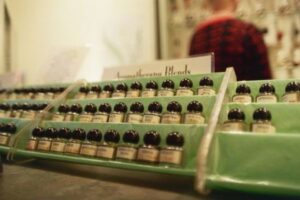3 Best Essential Oils For Cleaning

If you make your own cleaning products, you likely love that you can get your home sparkling clean without any dangerous chemicals, like those found in most name brand cleaning products. You also probably know that homemade cleaners can smell pretty…blah.
That powerful “clean” smell you get from conventional cleaners may make your home feel disinfected, but that aroma comes from a host of toxic chemicals. How else do you think a bathroom cleaner could smell like fresh mountain rain or strawberries?
Unlike conventional cleaners, homemade cleaning products don’t smell like much. Most recipes call for different varieties of a few staple ingredients like, baking soda, white vinegar, oil, salt, soap and water. In fact, using just these ingredients you can make a non-toxic oven cleaner, scour your wooden cutting boards, scrub your toilet bowl to shiny perfection, polish your furniture and more. Unfortunately, while these ingredients make for powerful, chemical-free cleaning, they smell quite bland. And in the case of vinegar, they can smell strong in not such a good way. That’s why most green cleaning recipes also call for essential oils.
Made by steaming or cold pressing raw plant material, essential oils are the distilled liquid essence of a plant. From tea tree to cilantro and grapefruit to vanilla, you can find most any plant or herb in an aromatic essential oil form.
These concentrated liquids can do more than just make your cleaning products smell fabulous. They can disinfect, purify and even remove stains—all without any toxic chemicals in the mix. Essential oils are naturally antimicrobial and antibacterial. Some, of course, work better for cleaning than others. These three essential oils will not only give your products a delicious aroma, they’ll also punch up your homemade products’ cleansing properties.
Lemon essential oil
Made by cold pressing the rind of fresh lemons, lemon essential oil smells intoxicatingly like a fresh, ripe lemon. Add a few drops to your favorite homemade cleaners to infuse the scent of lemon throughout your home. It will give your home that distinct Pine-Sol lemon smell without any of the nasty chemicals. Lemon essential oil can also help brighten and remove stains. Add a few drops to a gallon of water when mopping your white tile floors, or use it with your homemade laundry detergent to brighten white clothes.
Peppermint essential oil
With its refreshing minty scent and powerful antibacterial properties, peppermint essential oil is a perfect complement to homemade cleaning products. Add a few drops to your favorite homemade spray cleaners and spritz the mixture on areas that need particular antibacterial attention, like bathrooms and kitchens. As an added bonus, peppermint also acts as a natural pest deterrent.
Also, don’t be afraid to mix your essential oils to create aromatic blends. Peppermint mixes especially well with other essential oils popular for cleaning, including lavender, eucalyptus, lemon and rosemary.
Tea tree essential oil
Made from the Australian Melaleuca tree, tea tree essential oil offers antibacterial, antiseptic and antifungal properties. It works especially well to get rid of mildew and mold around the house. Simply mix two teaspoons tea tree oil with two cups water in a spray bottle. Then, spritz the mixture on moldy or mildewy areas, like showers. Don’t rinse off the mixture. Let it work away at those yucky substances. You can also use this spray anywhere that has a musty smell.
Tea tree can add a lovely, medicinal smell to your cleaning products. Add a few drops to a bucket of soapy water before you mop your floor to permeate its distinctive scent throughout your home. Or, add several drops to your favorite homemade laundry detergent to give your clothes a fresh, therapeutic scent.
Where to find essential oils
Look for essential oils at health food stores. They usually come in tiny green or blue bottles. When shopping for essential oils, make sure to look for pure, undiluted essential oils that don’t have any extra carriers, diluents or other additives. Also, try to find certified organic brands.
Follow Kirsten on Twitter @kirsten_hudson, Google+ and Pinterest.
image: cafemama

